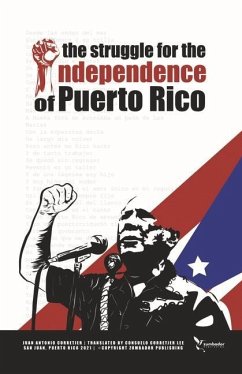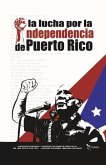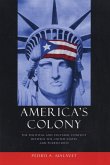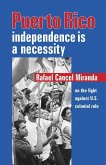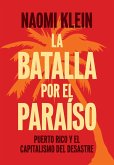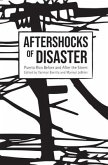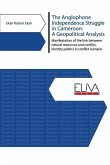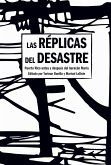Juan Antonio Corretjer
The Struggle for the Independence of Puerto Rico
Übersetzer: Lee, Consuelo Corretjer
Juan Antonio Corretjer
The Struggle for the Independence of Puerto Rico
Übersetzer: Lee, Consuelo Corretjer
- Broschiertes Buch
- Merkliste
- Auf die Merkliste
- Bewerten Bewerten
- Teilen
- Produkt teilen
- Produkterinnerung
- Produkterinnerung
""The Struggle for the Independence of Puerto Rico" (La lucha por la independencia de Puerto Rico) is an essay on the history of Puerto Rico's attempts at liberation from colonial rule from Spain, in the 19th century, and from United States colonialism from 1898 to the present."--
Andere Kunden interessierten sich auch für
![La Lucha Por La Independencia de Puerto Rico La Lucha Por La Independencia de Puerto Rico]() Juan Antonio CorretjerLa Lucha Por La Independencia de Puerto Rico25,99 €
Juan Antonio CorretjerLa Lucha Por La Independencia de Puerto Rico25,99 €![America's Colony America's Colony]() Pedro A MalavetAmerica's Colony34,99 €
Pedro A MalavetAmerica's Colony34,99 €![Puerto Rico: Independence Is a Necessity Puerto Rico: Independence Is a Necessity]() Rafael Cancel MirandaPuerto Rico: Independence Is a Necessity7,49 €
Rafael Cancel MirandaPuerto Rico: Independence Is a Necessity7,49 €![La Batalla Por El Paraíso La Batalla Por El Paraíso]() Naomi KleinLa Batalla Por El Paraíso11,99 €
Naomi KleinLa Batalla Por El Paraíso11,99 €![Aftershocks of Disaster Aftershocks of Disaster]() Aftershocks of Disaster15,99 €
Aftershocks of Disaster15,99 €![The Anglophone Independence Struggle in Cameroon: A Geopolitical Analysis: Manifestation of the link between natural resources and conflict, identity The Anglophone Independence Struggle in Cameroon: A Geopolitical Analysis: Manifestation of the link between natural resources and conflict, identity]() Ekah Robert EkahThe Anglophone Independence Struggle in Cameroon: A Geopolitical Analysis: Manifestation of the link between natural resources and conflict, identity34,99 €
Ekah Robert EkahThe Anglophone Independence Struggle in Cameroon: A Geopolitical Analysis: Manifestation of the link between natural resources and conflict, identity34,99 €![Las Réplicas del Desastre Las Réplicas del Desastre]() Las Réplicas del Desastre17,99 €
Las Réplicas del Desastre17,99 €-
-
-
""The Struggle for the Independence of Puerto Rico" (La lucha por la independencia de Puerto Rico) is an essay on the history of Puerto Rico's attempts at liberation from colonial rule from Spain, in the 19th century, and from United States colonialism from 1898 to the present."--
Produktdetails
- Produktdetails
- Verlag: Publishdrive Inc.
- Seitenzahl: 174
- Erscheinungstermin: 10. Juni 2022
- Englisch
- Abmessung: 211mm x 135mm x 10mm
- Gewicht: 318g
- ISBN-13: 9781667837956
- ISBN-10: 1667837958
- Artikelnr.: 63937518
- Verlag: Publishdrive Inc.
- Seitenzahl: 174
- Erscheinungstermin: 10. Juni 2022
- Englisch
- Abmessung: 211mm x 135mm x 10mm
- Gewicht: 318g
- ISBN-13: 9781667837956
- ISBN-10: 1667837958
- Artikelnr.: 63937518
Juan Antonio Corretjer, born in Ciales, Puerto Rico on March 3, 1908, was a poet of extraordinary sensibility, essayist, journalist, and gifted speaker. One of the most important Puerto Rican political and literary figures of all time, his many poetic works were inspired by his love for his homeland. Life in the country is presented in all of its dimensions and perspectives, gathering the innermost feelings of the nation, and shaping the poetic lifeblood of its history. A recurrent theme in his poetry is the love of family, which to him is not only parents, wife, and children, but also the people from his country. Corretjer the writer of prose has a collection of short stories, El cumplido, and an important collection of essays, that probe into the very heart of Puerto Rico's historical problems, and the contradictions between the reformist and revolutionary tendencies that have characterized the struggle for national liberty. His works about literary and patriotic figures, the function and meaning of art, the imperial colonial impositions on the Puerto Ricans, and the myths, realities¬ and future of the Island combine a deep knowledge of his country¬ and of the writer's craft. In 1924 the magazine Puerto Rico Ilustrado published some of his early poems, and in 1927 he was initiated into journalism at the newspaper La Democracia, where he worked as a reporter, writer, editorialist and columnist, totally immersed in a literary career. But his course changed in 1930, when he joined the Partido Nacionalista (Nationalist Party) and was elected secretary, as Pedro Albizu Campos became president. He participated in the assault to the colonial senate in 1932, and in the sugar industry workers' strike of 1934. That year he was appointed the party's delegate abroad to obtain support for the cause of independence. He traveled to the Dominican Republic, Haiti, and Cuba, participated in the Cuban general strike of March 1935, was arrested, imprisoned, tried, declared persona non grata, and expelled from that country. A year after returning from Cuba, he was jailed at La Princesa for refusing to surrender the minutes and logbooks of the Partido Nacionalista to the Federal Court. On July 30, 1936, he received a ten-year sentence of imprisonment and exile with Albizu Campos, Luis F. Velázquez, Clemente Soto Vélez, Erasmo Velázquez, Pablo Rosado Ortiz, Juan Gallardo Santiago, and Julio Héctor Velázquez. All were transported to a federal prison in Atlanta, Georgia on June 7, 1937. In addition to his journalistic career in Puerto Rico, Corretjer worked in that profession in Cuba and the United States. He founded several newspapers of pro-independence editorial line in Puerto Rico, directed the Partido Nacionalista's newspaper, El Nacionalista, and founded and directed Pueblos Hispanos, while in exile in New York from 1943 until 1945. Returned from exile, Corretjer continued his political activism through organizing, public speaking and writing against United States Imperialism in Puerto Rico until the end of his life. The Puerto Rican communities in the United States knew him as the voice for surviving puertorriqueñidad (Puertoricanness) despite the up rootedness and exile. Corretjer was always present where there was a struggle for the rights of his people, and unwavering faith in justice for all peoples was his trademark.

